
Algiers is the capital and largest city of Algeria. The city's population at the 2008 census was 2,988,145 and in 2020 was estimated to be around 4,500,000. Algiers is in the north-central part of Algeria.

As the tenth-largest country in the world, and the largest in Africa and in the Mediterranean region, Algeria has a vast transportation system that includes a large and diverse transportation infrastructure.
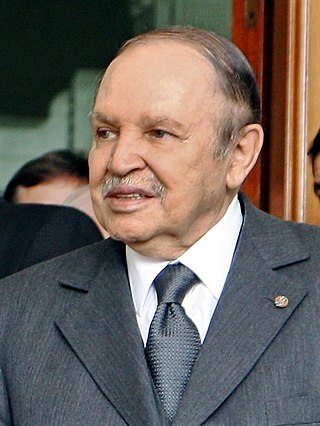
Abdelaziz Bouteflika was an Algerian politician and diplomat who served as President of Algeria from 1999 to his resignation in 2019.

Houari Boumediene International Airport, also known as Algiers Airport or Algiers International Airport, is the main international airport serving Algiers, the capital of Algeria. It is located 9.1 NM east southeast of the city.
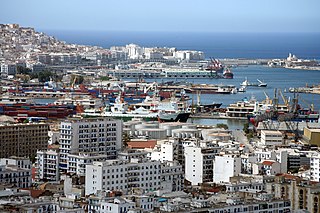
Mohamed Belouizdad is a quarter of Algiers, Algeria in Algiers Province. The quarter was formerly known as Belcourt during the French colonisation period. It was renamed as Hamma-El Annasser after Algerian independence, before the present name Belouizdad was adopted in 1992 in honour of the Algerian militant and nationalist Mohamed Belouizdad who lived in the quarter.

Rouïba or Rouiba is a municipality of Algeria. It is located 22 kilometres (14 mi) in the eastern suburbs of Algiers in one of the most healthy localities of Algeria. It is also the district seat of Rouïba District in Algiers Province. Its inhabitants are called Rouibéens.

The Algiers Metro is a rapid transit system that serves Algiers, the capital of Algeria. Originally designed in the 1970s, it opened in 2011 after decades of delays due to financial difficulties and security issues. The Algiers Metro was the second metro system to open in Africa, after the Cairo Metro.

The 2010–2012 Algerian protests were a series of protests taking place throughout Algeria, lasting from 28 December 2010 to early 2012. The protests had been inspired by similar protests across the Middle East and North Africa. Causes cited by the protesters included unemployment, the lack of housing, food-price inflation, corruption, restrictions on freedom of speech and poor living conditions. While localized protests were already commonplace over previous years, extending into December 2010, an unprecedented wave of simultaneous protests and riots, sparked by sudden rises in staple food prices, erupted all over the country starting in January 2011. These were quelled by government measures to lower food prices, but were followed by a wave of self-immolations, most of them in front of government buildings. Opposition parties, unions, and human rights organisations then began to hold weekly demonstrations, despite these being illegal without government permission under the ongoing state of emergency; the government suppressed these demonstrations as far as possible, but in late February yielded to pressure and lifted the state of emergency. Meanwhile, protests by unemployed youth, typically citing unemployment, hogra (oppression), and infrastructure problems, resumed, occurring almost daily in towns scattered all over the country.

Ali Haddad, arabic: علي حداد is an Algerian Businessman. He is the co-founder and CEO of ETRHB, and has been the president of the FCE since 2014.
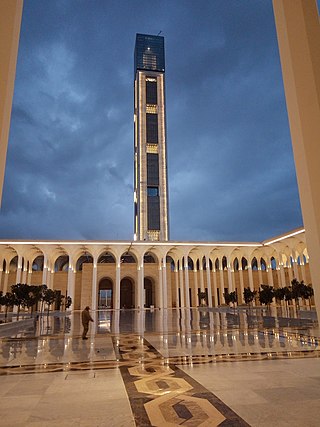
Djamaa el Djazaïr, also known as the Great Mosque of Algiers, is a mosque in Algiers, Algeria. It houses the world's tallest minaret and is the third-largest mosque in the world after the Great Mosque of Mecca and Al-Masjid an-Nabawi of Medina in Saudi Arabia.

Ouled EL Bahdja, is a campaign among fans of USM Alger to restore the matchday atmosphere within Virage specifically, and Omar Hamadi Stadium more generally. It was established by a group of Algiers fans from Casbah in the nineties. Their songs are chanted by all the demonstrators in the four corners of the country and even elsewhere in the world. They refuse any public appearance and any media interview. They wish to remain anonymous, as they only sing for their club USM Alger. With the advent of Groupe SERPORT, the group suffered from legal prosecutions from people from the company's surroundings because of their criticism of the management method, and it increased because of the stadium issue, where Ouled EL Bahdja insisted on returning to its stronghold, the Omar Hamadi Stadium.

Yahia Boushaki is an Algiers residential, administrative and commercial neighbourhood located in the commune of Bab Ezzouar in Kabylie within Algeria.
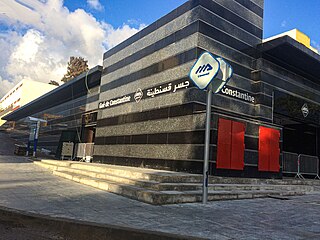
Gué de Constantine is a transfer station serving the Line 1 of the Algiers Metro it was inaugurated on 9 April 2018 by President Abdelaziz Bouteflika.
Les Ateliers is a transfer station serving the Line 1 of the Algiers Metro it was inaugurated on 9 April 2018 by President Abdelaziz Bouteflika.
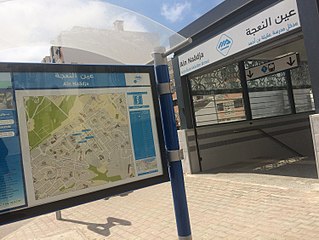
Ain Naadja is a transfer station serving the Line 1 of the Algiers Metro, it was inaugurated on 9 April 2018 by President Abdelaziz Bouteflika.
The 2018–19 Algerian Ligue Professionnelle 1 was the 57th season of the Algerian Ligue Professionnelle 1 since its establishment in 1962. A total of 16 teams contested in the league.

The 2019–2021 Algerian protests, also called Revolution of Smiles or Hirak Movement, began on 16 February 2019, six days after Abdelaziz Bouteflika announced his candidacy for a fifth presidential term in a signed statement. These protests, without precedent since the Algerian Civil War, were peaceful and led the military to insist on Bouteflika's immediate resignation, which took place on 2 April 2019. By early May, a significant number of power-brokers close to the deposed administration, including the former president's younger brother Saïd, had been arrested.

Mostefa Bouchachi, born in 1954 in Sidi Abdelaziz, in the current Jijel Province, Algeria, is an Algerian lawyer and politician.
There are a number of cemeteries in Algiers. Among them is the Thaalibia Cemetery, the oldest one. A number of them have listed buildings or structures, or have been classified and registered as historic Algiers heritage.




























